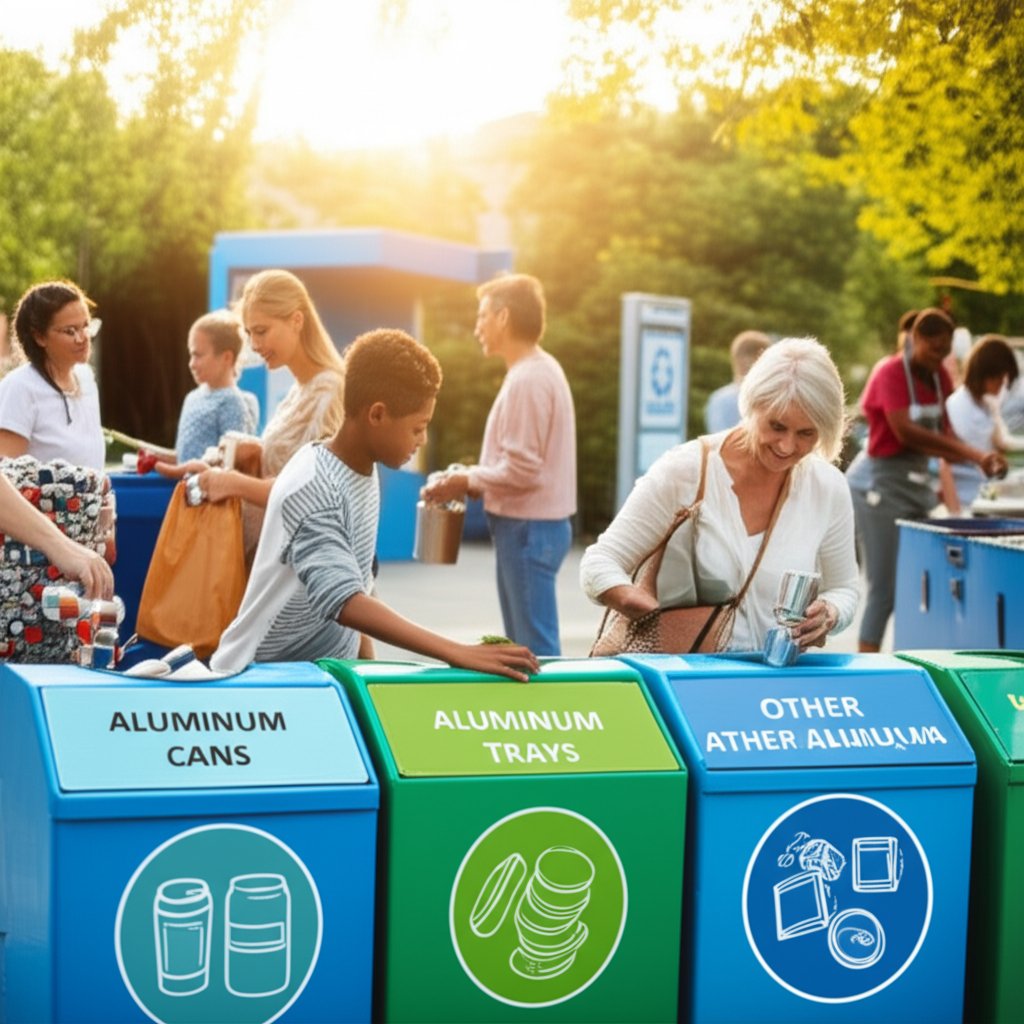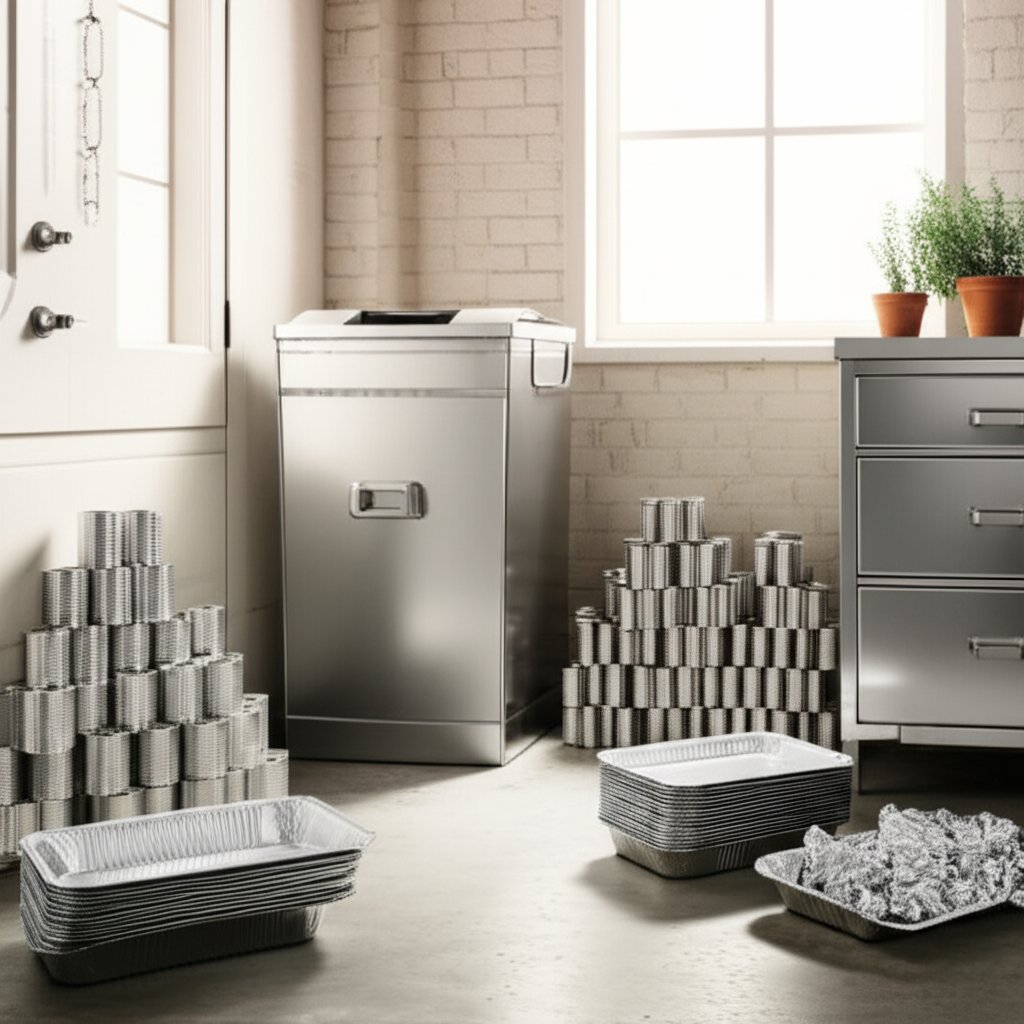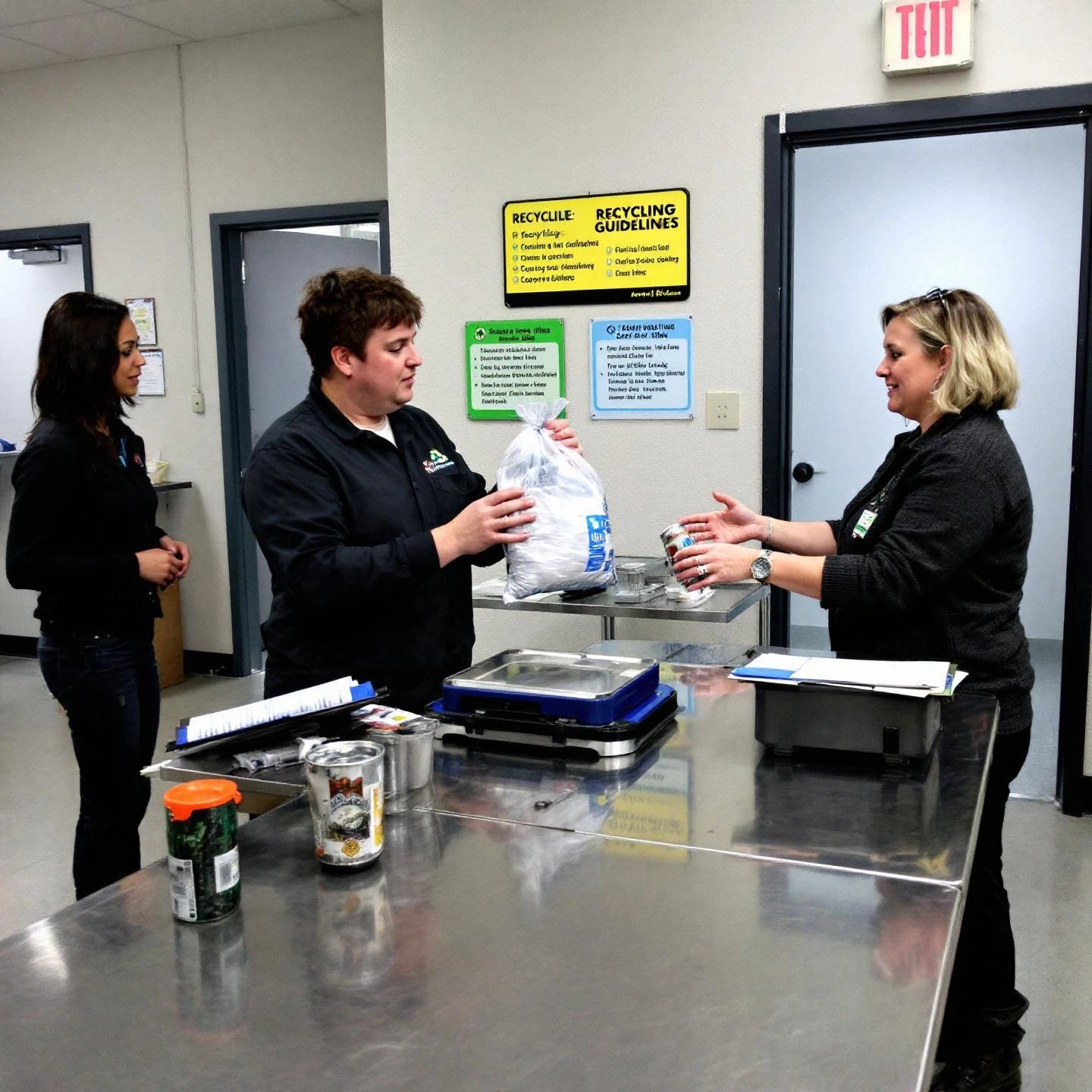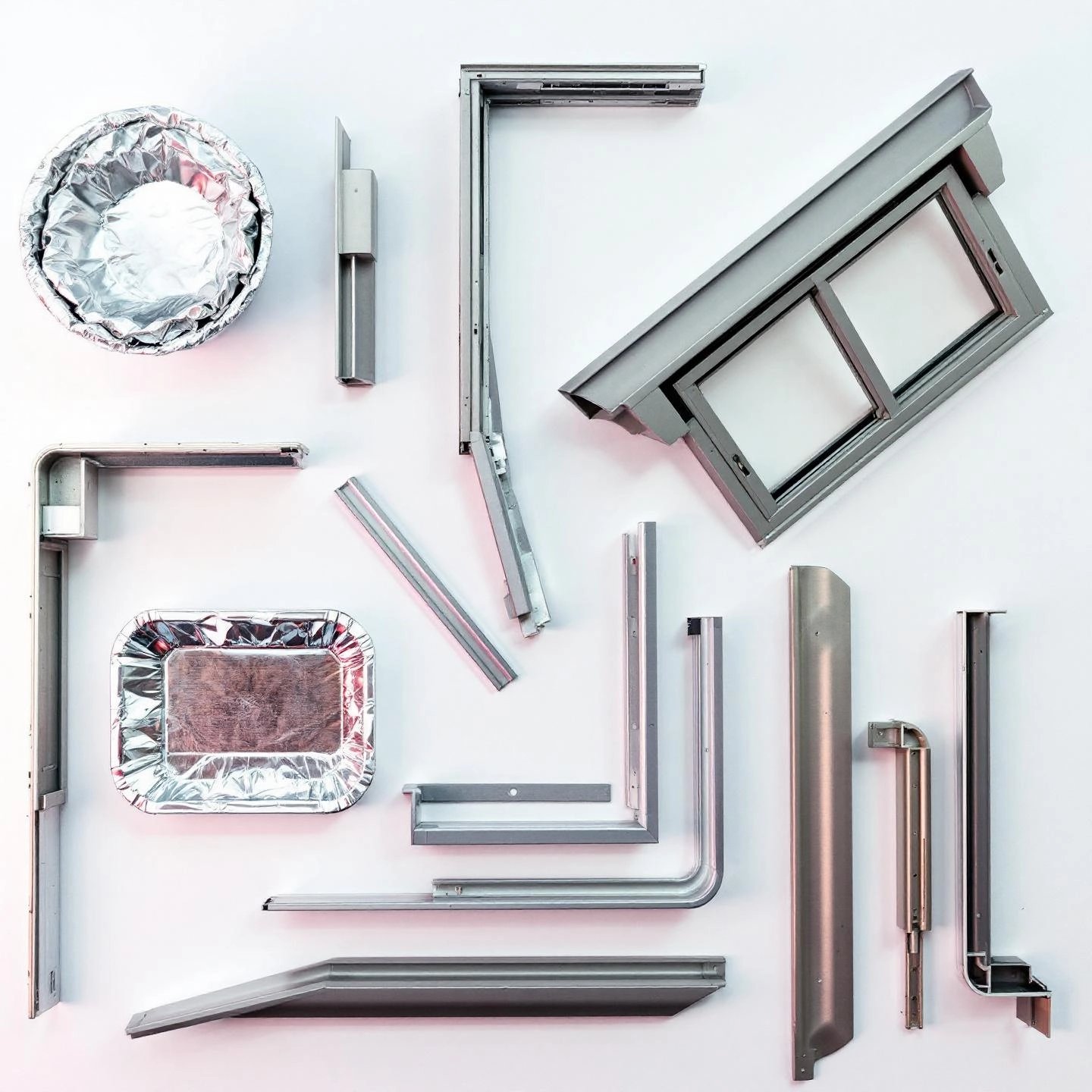
Ever wondered what happens to the empty soda can you toss in the recycling bin? Or maybe you’ve typed “aluminum recycling near me” into a search bar, hoping to do something good for the planet—and maybe your wallet. If so, you’re not alone. Aluminum recycling is one of the simplest, most impactful ways individuals and communities can make a difference, both environmentally and economically.
Let’s break it down: Aluminum is everywhere, from beverage cans and foil to window frames and car parts. Unlike many materials, aluminum can be recycled over and over—without losing its quality or strength. In fact, nearly 75% of all aluminum ever produced is still in use today, thanks to this remarkable property. That means every time you recycle aluminum, you’re helping to keep valuable resources in circulation instead of sending them to landfills.
But why is this so important? Consider these key benefits:
Imagine this: The energy saved from recycling a single aluminum can is enough to power a television for three hours. Multiply that by the billions of cans recycled each year, and you’ll notice the impact is enormous.
This guide will walk you through everything you need to know about finding local options for aluminum recycling—whether you’re searching for “where to recycle aluminum near me” or looking for tips on maximizing your earnings. By understanding how and why to recycle aluminum, you’ll be equipped to make choices that benefit both your community and the planet.

Ever wondered how to turn yesterday’s soda can or old foil tray into something new—and maybe even earn a few bucks along the way? If you’ve searched for “recycle aluminum near me,” you’re already on the right track. Aluminum recycling is straightforward, and anyone can start making a difference with just a few simple steps.
When people think of recycling aluminum, beverage cans are usually the first thing that comes to mind. But the list doesn’t stop there. The most commonly accepted aluminum items at local recycling centers include:
Sorting your aluminum from other recyclables is key. If you’re unsure whether an item is aluminum, try the magnet test: magnets won’t stick to aluminum, but they will to steel.
Getting started is easier than you might think. Here’s a simple approach to begin your aluminum recycling journey:
Once you’ve collected enough aluminum, the next step is to find a local recycling facility. Here’s how the journey typically unfolds:
Behind the scenes, your aluminum goes through a series of steps: sorting, cleaning, shredding, melting, and finally being formed into new products—from fresh cans to car parts. Recycling aluminum is incredibly efficient, saving up to 90% of the energy compared to making new aluminum from raw materials.
Whether you’re collecting cans at home or organizing a workplace drive, every bit of aluminum you recycle helps conserve resources and reduce waste. As you gather your first batch, you’ll likely wonder where to take it and how to find trustworthy recycling centers. In the next section, we’ll explore how to identify official aluminum recycling centers and ensure your efforts have the greatest impact.
When you’re ready to drop off your collected cans or foil, you might wonder: How do I find a legitimate aluminum recycling center near me? With so many options online, making sure you choose a reputable, certified facility is crucial—not just for getting fair value, but also for ensuring your efforts support responsible recycling.
Sounds complex? It doesn’t have to be. Here’s a practical approach to locating trustworthy aluminum recyclers in your community:
Not all recycling centers are created equal. To ensure you’re working with reputable aluminum recyclers, keep these points in mind:
By following these steps and using these resources, you’ll not only find a reliable aluminum recycling center near you, but also ensure your efforts contribute to responsible, sustainable recycling. Next, we’ll zoom in on the most popular form of aluminum recycling—cans—and how to make the process even easier in your own neighborhood.
When you think of aluminum recycling, chances are you picture a pile of empty soda cans. There’s a good reason for that—aluminum can recycling is one of the most accessible and widely practiced forms of recycling in the U.S. But how easy is it to get started, and what’s the best way to make sure your cans are actually recycled? Let’s break it down so you can confidently search for “aluminum can recycling near me” and know exactly what to do next.
Aluminum cans are everywhere—at home, at work, at community events. Unlike some other aluminum products, nearly every curbside and drop-off recycling program accepts them. The process is so efficient that a can you recycle today could be back on store shelves as a brand-new can in as little as 60 days. This closed-loop cycle saves up to 95% of the energy compared to making cans from new materials, and each recycled can helps reduce landfill waste and greenhouse gas emissions (Okon Recycling).
Ready to start collecting? Here’s how to make aluminum cans recycling near you both efficient and hassle-free:
This is a common question. While some people crush cans to save space, many recycling facilities now recommend leaving cans uncrushed. Why? Crushed cans can sometimes slip through sorting equipment and be missed, especially in single-stream recycling programs (All American Recycling). To be safe, check with your local facility—if you’re unsure, it’s usually best to leave cans whole and simply rinse them.
Searching for “aluminum can recycling near me” is often more straightforward than looking for places that accept foil, trays, or larger aluminum items. That’s because cans are:
Imagine: Just by collecting cans from your daily drinks, you can reduce waste, conserve energy, and even earn a little extra cash. And because the process is so streamlined, it’s ideal for families, schools, and community groups looking to make a positive impact.
As you gather your cans, you might start to wonder about maximizing their value or finding the best local options for cashing them in. In the next section, we’ll explore how to turn your aluminum cans into real rewards—and what you need to know to get the best payout.

Ever wondered if that bag of aluminum cans in your garage could actually put money in your pocket? If you’ve searched for “aluminum recycling near me for cash,” you’re not alone. Many people are surprised to learn how accessible—and rewarding—aluminum recycling can be. Let’s demystify the process, so you’ll know exactly what to expect when cashing in your aluminum scrap and how to get the best possible payout.
When you bring aluminum to a recycling center or scrap yard, your payout is based on weight—typically measured in pounds. The price per pound can vary significantly, depending on your region, the type of aluminum you’re recycling, and current market demand. For example, recent market reports show that prices for common aluminum scrap like cans range from as low as $0.05 per pound in some areas, up to $0.60 or more in others, with the highest rates often found in Western states (The Penny Hoarder). On average, you’ll find prices hovering around $0.56 per pound for aluminum cans.
Sounds simple, right? But there’s a bit more to it. Aluminum scrap is often categorized—clean, sorted cans fetch a higher price than mixed metals or dirty items. The price can also be influenced by global aluminum demand, with manufacturers like Shengxin Aluminum actively seeking high-quality recycled material to support advanced manufacturing needs. This ongoing demand helps keep scrap values strong in many regions.
Curious how much you could earn? Here’s a simple table based on average U.S. prices and typical can weights:
| Number of Cans | Approx. Weight (lbs) | Potential Earnings (at $0.56/lb) |
|---|---|---|
| 32 | 1 | $0.56 |
| 320 | 10 | $5.60 |
| 1,000 | 31.25 | $17.50 |
| 5,000 | 156.25 | $87.50 |
Imagine earning a little extra each month just by recycling what you already use—while also supporting a circular economy that benefits advanced manufacturers and the environment. In the next section, we’ll guide you through the logistics of dropping off your aluminum and what to expect at your local recycling center, so you can make your recycling journey as efficient and rewarding as possible.
Ever stood in your garage with a bag of cans and wondered, “Where can I recycle aluminum cans near me?” Or maybe you’ve searched for an aluminum drop off near me but felt unsure about what to expect. Don’t worry—recycling aluminum locally is easier than you might think. Let’s break down the logistics, so your next trip is smooth, efficient, and rewarding.
Imagine you’ve collected a bin full of aluminum cans, trays, or foil. Where do you take them? Here are the most common options:
Arriving at a recycling center for the first time? Here’s what usually happens:
Planning ahead saves time. Most recycling centers and drop-off sites operate during standard business hours, but some may close early or have limited weekend hours. Always check online or call ahead to confirm:
| What to Ask Your Local Recycling Center | |
|---|---|
| 1. | What types of aluminum do you accept (cans, foil, trays, scrap)? |
| 2. | Do you pay by weight, by count, or offer deposit refunds? |
| 3. | Are there minimum or maximum amounts for drop-off? |
| 4. | What are your hours of operation? |
| 5. | Do I need to sort or clean my aluminum before bringing it in? |
| 6. | Is identification required for large loads? |
| 7. | Are there any current restrictions or special instructions? |
Asking these questions ensures you’re prepared—no wasted trips, no surprises. You’ll notice that some centers have stricter rules than others, especially regarding cleanliness and sorting. Always follow posted guidelines to speed up your visit and maximize your return.
Ready for your first drop-off? With the right preparation, the process is quick and straightforward. Next, we’ll look at how to handle aluminum alongside other household recyclables, so you can streamline your recycling routine and make the most of every trip.
Ever looked at your recycling bin and wondered, "Do I need to separate aluminum from plastic or steel?" Or maybe you’ve searched for “plastic and aluminum recycling near me” hoping to find a one-stop drop-off. Sorting recyclables can feel confusing, but with a few simple tips, you’ll streamline your routine and boost both your environmental impact and your recycling returns.
Imagine tossing all your recyclables—cans, bottles, foil, and trays—into one bin. Sounds easy, right? In many communities, this is called commingled or single-stream recycling, where all accepted items go into the same container and are sorted later at a facility (Treehugger). However, not every area uses this system, and improper sorting can lead to contamination—meaning your recyclables might end up in the landfill instead of being reused.
Proper sorting is especially important for metals. Aluminum is a non-ferrous metal (not magnetic), while steel is ferrous (magnetic). Mixing these can reduce the value of your scrap by up to 40% and may even cause your load to be rejected. Clean, separated aluminum—free of plastic, food, or other metals—fetches the best price and is easier for facilities to process.
Sounds complex? It’s actually pretty straightforward. Here’s how you can sort aluminum from other recyclables at home:
Wondering where to take your sorted recyclables—or if you can drop off everything in one place? Many recycling centers and municipal drop-off sites accept a wide range of materials, including aluminum, plastic, and steel. When searching online, try terms like “metal and aluminum recycling near me” or “plastic and aluminum recycling near me” to find facilities that handle mixed loads.
By sorting aluminum from other recyclables and following local guidelines, you’ll maximize your recycling impact and returns. Plus, you’ll make it easier for facilities to process your materials efficiently—ensuring more gets reused and less goes to waste.
Next, we’ll dive into how to prepare your aluminum for recycling, so you can make every trip to the center count and support a cleaner, more sustainable future.

Ever wondered why some people get better payouts for their aluminum scrap—or why certain recyclers only accept the cleanest loads? The secret isn’t just in what you collect, but how you prepare it. If you’re searching for advice on how to prepare aluminum for recycling, you’re about to discover that a little extra effort pays off, both for your wallet and the planet.
Imagine your local recycling center sorting through piles of cans, foil, and trays. The cleaner and more organized your aluminum, the easier it is to process—and the higher the quality of recycled material produced. Well-prepared aluminum is especially important for advanced manufacturers like Shengxin Aluminum, who depend on high-purity scrap to create everything from energy-efficient window frames to cutting-edge automotive parts. By following a few best practices, you not only boost your own returns but also support a more sustainable, circular economy.
Sounds complex? It’s actually simple once you break it down. Here’s a practical checklist to ensure your aluminum is recycling-ready—and as valuable as possible:
| Key Preparation Steps for Aluminum Recycling | |
|---|---|
| 1. | Sort aluminum from other metals and materials |
| 2. | Remove non-aluminum attachments and contaminants |
| 3. | Rinse and clean thoroughly |
| 4. | Crush cans only if recommended by your recycler |
| 5. | Cut and size large items for easy handling |
| 6. | Store in a dry, clean container |
By taking these steps, you’ll notice your aluminum is not only accepted more readily, but often fetches a higher price. Plus, you’re directly contributing to a supply chain that values quality—helping manufacturers like Shengxin Aluminum produce the next generation of eco-friendly, high-performance products.
Now that your aluminum is prepped and ready, let’s explore what else around your home or workplace can be recycled—opening up even more opportunities to make a difference and earn extra cash.

When you think about recycling aluminum, do cans immediately come to mind? You’re not alone. But what if you looked around your home or workplace and realized there’s a world of recyclable aluminum beyond the can? If you’ve ever searched for “aluminum items recycling near me” or wondered about “scrap aluminum recycling near me,” you might be surprised by just how many everyday items can be diverted from the landfill and turned into valuable resources.
Imagine clearing out your garage, attic, or even your kitchen drawers. You’ll likely find more aluminum than you expect—often in forms you didn’t realize were recyclable. Many local recycling centers and scrap yards accept a wide variety of aluminum products, making it easier than ever to maximize your impact and earnings.
Why recycle more than just cans? Aluminum is highly versatile and infinitely recyclable, meaning that every piece—no matter how big or small—can be transformed into something new. Recycling these items not only conserves resources and energy, but also helps keep valuable materials in the supply chain, supporting both environmental sustainability and the local economy (Cohen Recycling).
Ready to spot more opportunities for aluminum recycling? Here’s a list of everyday items that are commonly accepted at recycling centers and scrap yards:
By taking a closer look at what you have on hand, you’ll notice plenty of opportunities to recycle aluminum beyond the basics. Each item you divert from the landfill supports a cleaner environment and puts valuable resources back into the production cycle. Next, we’ll wrap up by highlighting the key benefits of aluminum recycling and how your efforts—big or small—make a real difference for your community and the planet.
Imagine this: every time you recycle a soda can, aluminum tray, or window frame, you’re not just cleaning up your home—you’re fueling a powerful cycle that benefits your community, your wallet, and the planet. Throughout this guide, we’ve explored the ins and outs of aluminum recycling—from finding a reliable aluminum recycling center to maximizing your cash returns and prepping your scrap for the best results. So, what makes aluminum recycling so impactful—and why should you keep searching for “aluminum recycling near me” as part of your routine?
Maybe you started with cans, but now you know that trays, foil, siding, and even auto parts can be recycled. Preparing your items takes just a few extra minutes—rinsing, sorting, and removing non-aluminum parts—but the payoff is real. Local recycling centers, buy-back programs, and community drop-offs make it simple to participate, no matter where you live or work.
Remember, every can, tray, or frame you recycle helps conserve resources, reduce energy use, and support manufacturers committed to sustainability—like Shengxin Aluminum. Your actions ripple outward, building a cleaner, greener, and more prosperous future for everyone. So the next time you finish a drink or complete a home project, don’t toss that aluminum—recycle it, and be part of something bigger. Start your search for a local recycling center today and unlock the value in every piece of aluminum you save.
Most centers accept beverage cans, foil, trays, window frames, gutters, and some auto parts. Always check with your local facility for their accepted items to ensure your aluminum scrap is eligible for recycling.
Use online directories like Earth911, Google Maps with customer reviews, and your city’s official waste management website. Look for centers with proper certifications, transparent pricing, and positive feedback to ensure legitimacy.
To get the best payout, keep your aluminum clean, sort it by type, remove non-aluminum attachments, and check current prices at local centers. Meeting minimum weight requirements and monitoring market trends can also increase your earnings.
Check with your local recycling center. Some prefer cans uncrushed for easier sorting, while others accept crushed cans. When in doubt, leave them whole unless your recycler recommends otherwise.
Properly sorted and cleaned aluminum is more valuable and easier to process. High-quality preparation supports efficient recycling and is essential for manufacturers like Shengxin Aluminum, who use recycled material for advanced products.
 บริการออนไลน์
บริการออนไลน์ 0086 136 3563 2360
0086 136 3563 2360 sales@sxalu.com
sales@sxalu.com +86 136 3563 2360
+86 136 3563 2360